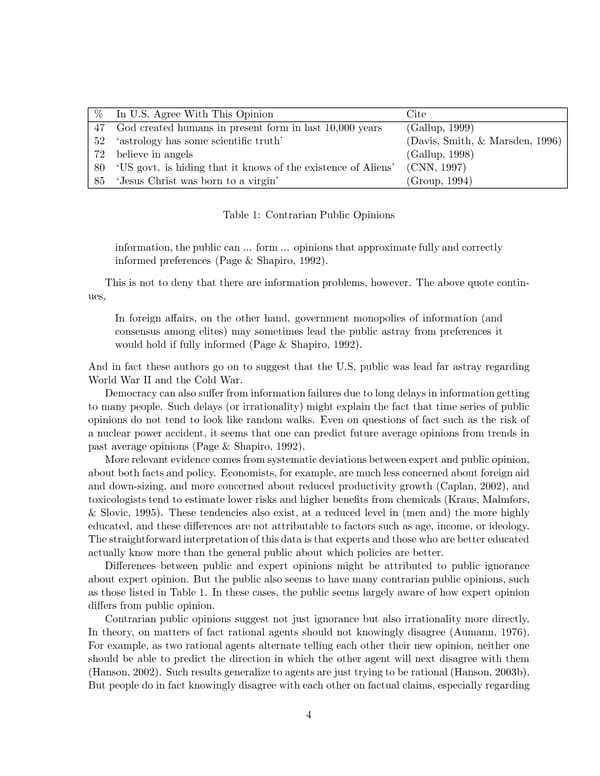% InU.S. Agree With This Opinion Cite 47 God created humans in present form in last 10,000 years (Gallup, 1999) 52 ‘astrology has some scientific truth’ (Davis, Smith, & Marsden, 1996) 72 believe in angels (Gallup, 1998) 80 ‘US govt. is hiding that it knows of the existence of Aliens’ (CNN, 1997) 85 ‘Jesus Christ was born to a virgin’ (Group, 1994) Table 1: Contrarian Public Opinions information, the public can ... form ... opinions that approximate fully and correctly informed preferences (Page & Shapiro, 1992). This is not to deny that there are information problems, however. The above quote contin- ues, In foreign affairs, on the other hand, government monopolies of information (and consensus among elites) may sometimes lead the public astray from preferences it would hold if fully informed (Page & Shapiro, 1992). And in fact these authors go on to suggest that the U.S. public was lead far astray regarding World War II and the Cold War. Democracycanalsosufferfrominformationfailuresdue tolongdelaysininformationgetting to many people. Such delays (or irrationality) might explain the fact that time series of public opinions do not tend to look like random walks. Even on questions of fact such as the risk of a nuclear power accident, it seems that one can predict future average opinions from trends in past average opinions (Page & Shapiro, 1992). Morerelevantevidencecomesfromsystematicdeviationsbetweenexpertandpublicopinion, aboutbothfactsandpolicy. Economists,for example, aremuchlessconcerned about foreignaid and down-sizing, and more concerned about reduced productivity growth (Caplan, 2002), and toxicologists tend to estimate lower risks and higher benefits from chemicals (Kraus, Malmfors, &Slovic, 1995). These tendencies also exist, at a reduced level in (men and) the more highly educated, and these differences are not attributable to factors such as age, income, or ideology. Thestraightforwardinterpretationofthisdataisthatexperts andthosewho arebettereducated actually know more than the general public about which policies are better. Differences between public and expert opinions might be attributed to public ignorance about expert opinion. But the public also seems to have many contrarian public opinions, such as those listed in Table 1. In these cases, the public seems largely aware of how expert opinion differs from public opinion. Contrarian public opinions suggest not just ignorance but also irrationality more directly. In theory, on matters of fact rational agents should not knowingly disagree (Aumann, 1976). For example, as two rational agents alternate telling each other their new opinion, neither one should be able to predict the direction in which the other agent will next disagree with them (Hanson, 2002). Such results generalize to agents are just trying to be rational (Hanson, 2003b). But people do in fact knowingly disagree with each other on factual claims, especially regarding 4
 Shall We Vote on Values, But Bet on Beliefs? Page 5 Page 7
Shall We Vote on Values, But Bet on Beliefs? Page 5 Page 7